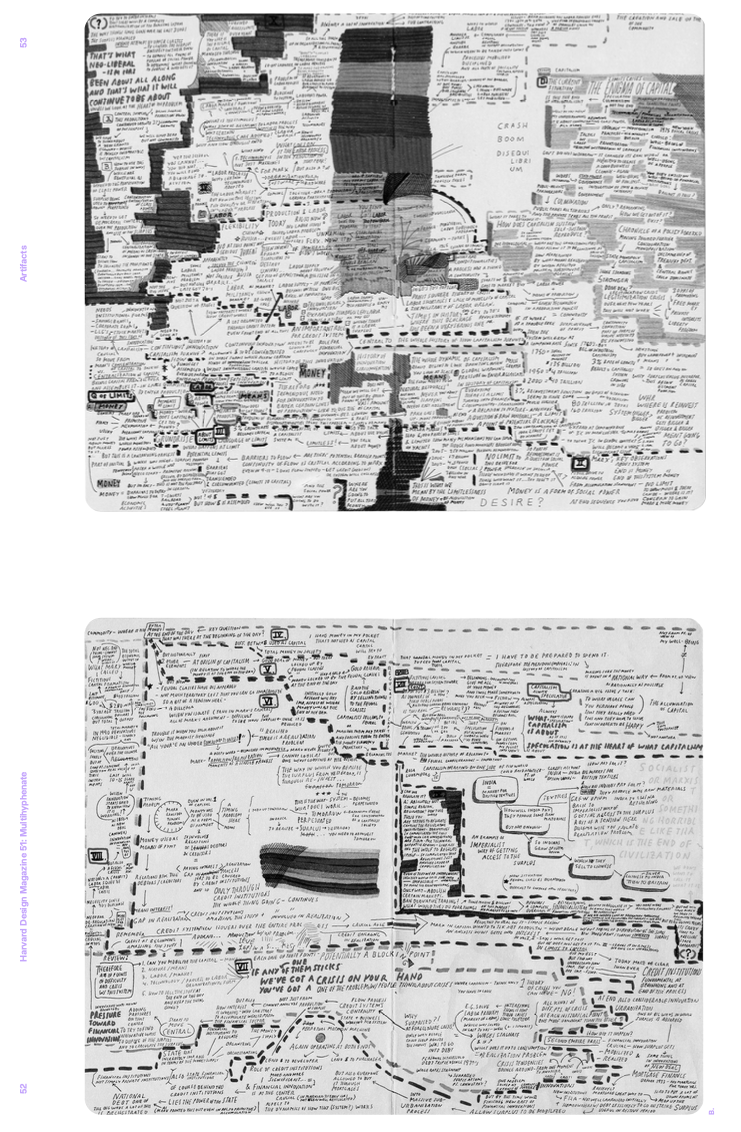Frequently associated with romantic notions of inter- or multidisciplinarity, the multihyphenate is often heroized by academics and cultural workers for embodying a virtuosic, polymathic Renaissance vision of unrestrained self-expression.1 Yet as a term that emerged in the sphere of cultural production in the 1970s, “multihyphenate” became more commonly used to describe someone who could triangulate talent (or an iconic identity) with managerial capabilities and self-marketing skills—a sum of qualities celebrated for its potential to accrue individual capital. This shift from a valorization of knowledge accrual and artistic expression, to the celebration of profitable triumphs in the creative economies, reflects a seemingly unlikely jump. Yet what connects both is the tethering of mirage-like freedoms to individual accumulation and a break from community, coordination, and collaboration in history and métier alike.
As an avatar of homo oeconomicus, the political and economic subject that Michel Foucault described as the “entrepreneur of himself,” the multihyphenate is but one actor within a much longer, more complex narrative outlining the transition from liberal humanism to neoliberalism—understood, broadly, as a policy model and ideological worldview concerned with applying a market approach to all sectors of life.2 We see neoliberal logics most prominently in the evolution of corporate personhood. Consider the ontological erosions that have taken place between persons and companies in the United States for over a century. From the safeguarding of constitutional rights for companies in 1873, to the Supreme Court’s 2010 ruling in support of a corporation’s right to free speech, progressive shifts have rendered the freedoms of civil liberties synonymous with business in an increasingly deregulated economy.3
Yet the reaches of neoliberalism’s effects extend well beyond policy, affecting the marketization of noneconomic spheres of life. To put it another way, this process is, in the words of Wendy Brown, the erosion of the economy, as an isolated sphere of life, to a more pervasive condition of economization.4 Brown writes, “To speak of the relentless and ubiquitous economization of all features of life by neoliberalism is thus not to claim that neoliberalism literally marketizes all spheres, even as such marketization is certainly one important effect . . . rather, the point is that neoliberal rationality disseminates the model of the market to all domains and activities . . . and configures human beings exhaustively as market actors, always, only, and everywhere as homo oeconomicus.”5
Indeed, many aspects of contemporary life—from food consumption, to fitness, to education—are commercialized domains in which market subjects live their lives according to the transactional terms of shopping, and wield economic language, logic, and value sets to accrue individual gains. Even the pursuit of romance in the virtual marketplace of online dating is designed to maximize the return on one’s investment of time, reduce trial and error, and use probabilities and ratios to calculate supply and demand.6 Relations, people, politics, and affects in the worldview of neoliberal homo oeconomicus are but calculations and parcels of numbers.
The landscape of cultural production has not been spared the transition of labor to human capital either. Borrowing from the philosophical work of Fredric Jameson as well as Gilles Deleuze and Félix Guattari, who wrote about such socioeconomic transfigurations from within the contours of the moment nearly 40 years ago, the multihyphenate emerges as a kind of Frankenstein cultural figure formed from the frenzy of consumer capitalism.7 The love child of neoliberal reason and colonial conquest, its desire for professional proliferation mirrors the ever-expanding surface of capitalism. The function and aims of the multihyphenate are to swell and multiply one’s reach through conglomerative cultural domination. Expansion, territorialization, and the concentration of power are thus desirable markers of achievement for the multihyphenate in the increasingly precarious gig economy.
Winona LaDuke and Deborah Cowen describe colonialism as a Wiindigo, a giant monster of Anishinaabe legend. Wiindigo economy is like a mutant based on “an Ojibwe description of the spirit of excess”8 and “a cannibal creature—devouring its own.”9 Similarly, the multihyphenate’s and neoliberal homo oeconomicus’ unending appetites for capital accumulation are impelled by an unquestioned sense of entitlement and a belief in progress, echoing the Manifest Destiny of the United States, upon which its economic system is founded: the democratic conviction that expanding one’s dominion and elevating one’s conditions and rank in the pursuit of happiness is one’s birthright.10 Consider the colonial language we use to describe the multihyphenate and its domain: mogul, empire, luxury, power, success, growth, threat. Reciprocity is incommensurate with the mainstream understanding of multihyphenate identity, nor are its values proximate with and for an anticolonial understanding of life.
It is perhaps not surprising that an affection for creative pliancy and economic individualism would gain traction in the cultural sectors. As a catalyst and result of neoliberal rationality, culture plays an important role. Wendy Brown notes that while neoliberalism in the Global North has focused on security and policing as the subject and object of its alterations, its most common mechanisms for implementation have been through soft, not hard, power.11 From 3D modeling, illustration, and video editing to digital platforms such as YouTube, Instagram, and TikTok, cultural producers of soft power increasingly use the same tool kits for content production created by multinational corporations such as Adobe Inc., Alphabet Inc., Apple Inc., Microsoft Corporation, and Meta Platforms Inc. in our current era of flexible specialization. Relatedly, LaDuke and Cowen remind us that “at the center of the Wiindigo’s violence and destruction is infrastructure’s seemingly banal and technical world.”12
With a growing reliance on a common set of prosaic image economies and dissemination networks, modes of cultural expression, previously distinguished through disciplinary protocols and specialized audiences, inevitably become standardized. The homogenization of digital infrastructures, in turn, reflects the monocultural audiences and economic interests these sociotechnical systems are created by and for. After all, in the context of contemporary cultural production, cultural robustness is characterized by a subject matter’s plasticity and mimetic drive: its ability, as consumable content, to endlessly adapt to a growing vortex of platformization that continually blurs the boundaries between social and economic realms.13
The consolidation of platforms and software notwithstanding, make no mistake: the multihyphenate, as a construct, is staunchly interiorized and singular. Despite its conjunctive promises of hyphenization, it operates strictly from self-interest. It is what C.B. MacPherson referred to as a “possessive individualist”: “proprietor[s] of [our] own person or capacities, owing nothing to society for them.”14 Further still, the interiority of this figure stems from an equally narrow institutionalized practice of reinforcing a specific genre of human and a paradigm that have sought to operate as global principles, despite their rootedness in Western bourgeois tenets. Katherine McKittrick describes this ongoing set of practices as “a script . . . whose macro-origin story calcifies the hero figure of homo oeconomicus who practices, indeed normalizes, accumulation in the name of (economic) freedom. Capital is thus projected as the indispensable, empirical, and metaphysical source for all human life….”15 The end game is such that “the empirical and experiential lives of all humans are increasingly subordinated to a figure that thrives on accumulation.”16
Indeed, the seduction of neoliberal rationality is lodged in its promise of freedom, economic or otherwise. Such assurances resonate with the stories that minoritized cultural workers, and especially settlers of color without access to generational wealth, like me, have been told about the (North) American dream. Promises of financial freedom are often tethered to mythic origin stories about singular excellence used to justify scarce opportunities for model minorities. These fictions go on to describe how exceptional cultural producers representing the global majority exceeded the abilities of their non-white peers or beat the odds (of systemic inequalities) through their innate abilities to achieve the career opportunities and financial compensations typically afforded to white, male, middle and upper class cultural producers, often of European descent. Indeed, it is fairly common to see minoritized cultural producers in the mainstream media confuse the mogul-like economic gains accrued through the economization of the self as a type of proof that democracy and meritocracy exist. Yet despite its promises, capital accumulation has little incentive to transgress conventional ordinances of power and powerlessness codified in both the American dream and the immigrant dream. Interdependence, liberation, and justice have no place within homo oeconomicus’ neoliberal worldview.
To understand the excessive individualism and omnipotence of homo oeconomicus¬ requires contextualizing this model of subjectivity as part of an ongoing, colonial imperative, which Sylvia Wynter refers to as “our present ethnoclass (i.e., Western bourgeois) conception of the human, Man, which overrepresents itself as if it were the human itself.”17 In her dissection of the velocity of race in mobilizing a colonial conception of Man, Wynter details how this genre of Man is upheld in the knowledge systems of biocentric and economic discourses, and even supported by origin stories whose symbols and orders reinforce and naturalize capital accumulation as freedoms within an economic teleology.18 In this schema, homo oeconomicus implies a norm of being, despite referring to the most privileged individuals in every sector of society. Though it attempts to misrepresent itself and human capital as universal “generic individuals,” it is both “gendered and gendering,”19 racialized and racializing.
It is glaringly evident that the multihyphenate assumes a number of immense privileges. As Nikki Shaner-Bradford writes, “‘multi-hyphenation’ as a title is not universally accessible; it implies a certain intellectual capital inherently tied to wealth.”20 Indeed, to willingly engage in flexible forms of virtuosic forms of “immaterial labor”21 in the knowledge or creative industries is not the same situation as contract workers in retail or service industries holding down multiple jobs to make ends meet. Anamik Saha reminds us that racism and the construct of race have been baked into industrial cultural production since its advent as an extension of colonial rule, and these techniques are still intrinsic to systems of cultural production today.22 The multihyphenate, as a social invention, thus falsely implies that any individual can enter into the culture industries without barriers and dabble in a buffet of cultural labor tasks by choice. As a neoliberal genre and monohumanist norm of being, its omissions underscore a consideration of the people who are logically excluded from or exploited by the culture industries, along with those who are considered gratuitous or disposable in our present economic order.
Hyphens are useful in their conjunctive ability, but language is slippery and often misleading. Inventions like the multihyphenate serve to validate and legitimize the entrepreneurial operations of human capital, providing an illusion that a kind of unbridled creative and economic freedom exists. The overrepresentation of this seemingly emergent form of homo economicus as a genre of universal subjectivity demands that we should regard such figures in the social imaginary with a healthy suspicion, while considering the relationship of these ideals to the orders and knowledge systems of Western philosophy. Furthermore, we might question why one’s identity—even a professional or creative one—should be premised on singularity at all.
Returning to Wynter, she reminds us that “the central task of all human social orders is that of their production and stable reproduction.”23 By adhering to these neoliberal logics and monohumanistic genres of being that overrepresent themselves, we are inadvertently succumbing to economic fatalism: the belief that nothing better—including what DeForrest Brown, Jr. calls “multidimensional world systems,” or the emergence of counter cultures based on mutuality, consciousness, and hope—can exist.24 To react to a social classification with a sense of inevitability thus obscures the larger issue—not only in terms of the limitations of such a definition, but also in the ways this genre of being naturalizes the barbs in the system it exists to perpetuate.
- The modern university is a fitting site for the celebration of the polymath as a heralded figure of “genius.” Within the university’s jurisdiction, the pursuit of intellectual inquiry claims to operate universally, democratically, and without constraint. Likewise, such guaranteed freedoms theoretically allow its members, both paying and paid, to pursue topics of interest without limitations and inhibitions. Jacques Derrida notes that the modern university operates under such logics under the pretense of a commitment to veritas, which it ultimately cannot uphold; as an apparatus for the project of the Enlightenment, its augur was its promise to academic freedom: “an unconditional freedom to question and to assert, or even, going still further, the right to say publicly all that is required by research, knowledge, and thought concerning the truth.” However, as Sylvia Wynter’s body of work attests, the Enlightenment was a project about social reform, not democratic communion. It has always been linked to the reproduction of a particular subjectivity as universal ideal, rooted in a particular notion of Man, from which the concept of humanism and the humanities are derived. See Jacques Derrida, “The University Without Condition,” in Without Alibi, ed. and trans. Peggy Kamuf (Stanford: Stanford University Press, 2002), 202–203.
- Wendy Brown, Undoing the Demos: Neoliberalism’s Stealth Revolution (New York: Zone Books, 2015), 80. See also, Michel Foucault, The Birth of Biopolitics: Lectures at the Collège de France, 1978–1979, ed. Michel Senellart, trans. Graham Burchell (Hampshire, UK: Palgrave Macmillan, 2008), 147.
- See Slaughterhouse Cases, 83 U.S. 36 (1873) and Citizens United v. Federal Election Commission, 558 U.S. 310 (2010).
- Brown, Undoing the Demos, 81–82.
- Ibid., 31. Italics in original.
- See, for example, Ashley Fetters and Kaitlyn Tiffany, “The ‘Dating Market’ Is Getting Worse,” The Atlantic, February 25, 2020, https://www.theatlantic.com/family/archive/2020/02/modern-dating-odds-economy-apps-tinder-math/606982/. Accessed February 11, 2023.
- See Fredric Jameson, “Postmodernism and Consumer Society,” Amerikastudien 29, no. 1 (1984): 55–73; and Gilles Deleuze and Felix Guattari, Anti-Oedipus: Capitalism and Schizophrenia, trans. Robert Hurley, Mark Seem, and Helen R. Lane (Minneapolis: University of Minnesota Press, c. 1983).
- Winona LaDuke, “Winona LaDuke Calls for Indigenous-Led ‘Green New Deal’ as She Fights Minnesota Pipeline Expansion,” Democracy Now! (December 7, 2018), cited in Winona LaDuke and Deborah Cowen, “Beyond Wiindigo Infrastructure,” The South Atlantic Quarterly 119, no. 2 (April 2020): 253.
- Ibid.
- Leo Marx, The Machine in the Garden: Technology and the Pastoral Ideal in America (New York: Oxford University Press, 1964), 204–5. See also Leo Marx, “The idea of nature in America,” Daedalus 137, no. 2 (Spring 2008): 8–21.
- Brown, Undoing the Demos, 47.
- LaDuke and Cowen, “Beyond Wiindigo Infrastructure,” 244.
- Carlotta Benvegnù, Niccolò Cuppini, Mattia Frapporti, Floriano Milesi, and Maurilio Pirone (Into the Black Box), “Platform Battlefield: Digital Infrastructures in Capitalism 4.0,” South Atlantic Quarterly 120, no. 4 (October 2021): 690–91. The authors write, “…technologies can be read in their social character, which is, after all, also always and inevitably a political character. . . . Far from being “simple” private companies or marketplaces, (platforms) take on the form of actual ‘non-neutral digital infrastructures’ that determine social, political, and economic relations.” For more on “platform capitalism” as it pertains to the music industry, see DeForrest Brown, Jr., Assembling a Black Counter Culture (New York: Primary Information, 2022), 396–97.
- C.B. Macpherson, The Political Theory of Possessive Individualism: Hobbes to Locke (Oxford: Oxford University Press, 1962), 3; cited in Brown, Undoing the Demos, 92.
- Sylvia Wynter and Katherine McKittrick, “Unparalleled Catastrophe for Our Species? Or, to Give Humanness a Different Future: Conversations,” in Sylvia Wynter: On Being Human as Praxis, ed. Katherine McKittrick (Durham: Duke University Press, 2015), 10.
- Wynter and McKittrick, “Unparalleled Catastrophe," 10.
- Sylvia Wynter, “Unsettling the Coloniality of Being/Power/Truth/Freedom: Towards the Human, After Man, Its Overrepresentation—An Argument,” CR: The New Centennial Review 3, no. 3 (Fall 2003): 260.
- Wynter and McKittrick, “Unparalleled Catastrophe,” 10.
- Brown, Undoing the Demos, 106.
- Nikki Shaner-Bradford, “What Do You Do? I’m a Podcaster-Vlogger-Model-DJ,” The Outline, November 25, 2019, https://theoutline.com/post/8301/everyone-you-know-is-a-multi-hyphenate. Similarly, Wendy Brown observes that neoliberal shifts from workers to entrepreneurs, and labor to human capital, conceals class relations more so than classical liberalism. See Brown, Undoing the Demos, 65.
- See Maurizio Lazzarato, “Immaterial Labor,” in Radical Thought In Italy: A Potential Politics, ed. Paolo Virno and Michael Hardt (Minneapolis: University of Minnesota Press, 1996), 133–47.
- Anamik Saha, Race and the Cultural Industries (Cambridge, UK: Polity Press, 2018).
- Wynter, “On How We Mistook the Map for the Territory,” 134.
- Brown, Assembling a Black Counter Culture, 415.


